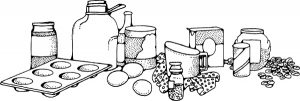
Health & Wellness

To Our Frontline Workers:
You are the greatest hero in this story. Your intelligence, bravery, and compassion are the saving grace of this nation during this pandemic.
Thank You for your service to humanity. We are so grateful for all of you.

How Fall Affects Your Allergies & Asthma
Cooler fall air is about to start blowing in, and along with it usually comes a spike in allergies and asthma problems.
Asthma is a chronic disease that causes airways to narrow, swell and produce mucus, making it hard to breathe, and it affects around 25 million Americans. Asthma attacks can be caused by airborne allergens, respiratory infections, physical activity and stress. Symptoms vary, but might often include:
- shortness of breath
- trouble sleeping caused by trouble breathing
- coughing or wheezing attacks worsened by a respiratory virus
For those with asthma, fall can feel like a season-long struggle with symptoms. But we’ve got a few natural ways to keep allergies and asthma attacks at bay.
Many people want to know what helps relieve their allergy symptoms fast. Browse through the allergy medicine aisle at any drugstore, and you’ll notice there is a multitude of options—many of which work very well to treat your symptoms.
Whether you’re looking to prevent certain side effects such as drowsiness or want to try a different approach to your current treatment plan, you may be curious whether supplements or other natural remedies could stifle your sniffling, sneezing, stuffiness, and more.
These three evidence-backed options could potentially deliver some relief.
- Quercetin
An antioxidant found in a variety of fruits, red wine, and onion; quercetin has been shown to help quell allergy symptoms. Scientists believe that taking quercetin may naturally halt your body from releasing certain inflammatory compounds that normally occur when you encounter an allergen.
- Stinging nettle
Stinging nettle, also known as Urtica dioica, is a plant that’s shown to have some promising potential as an anti-allergy aid. One recent study found that allergy sufferers who took stinging nettle in addition to their allergy medicines had a decrease in the severity of their symptoms. Stinging nettle contains compounds that show a natural anti-inflammatory effect that may block the production and release of histamine, and as a result, pump the brakes on the body’s allergic response.
- Butterbur
Butterbur is a plant that grows in Europe and parts of Asia and North America, and its extract may offer some relief for hay fever sufferers. Studies have found that taking butterbur may work just as well at improving symptoms and quality of life as some popular antihistamines. If you decide to try butterbur, look for products that are labeled “PA-free.” Raw, unprocessed butterbur contains chemicals known as pyrrolizidine alkaloids that can cause liver damage and other complications. Butterbur that’s “PA-free” has been processed to remove the potentially harmful compounds.
“Always talk with your health care provider before making any changes to your treatment plan,” says Laurie Garabedian, DO, a family medicine physician at Steward Health Care and Steward Medical Group. “If you’re considering any natural remedies, it’s important to discuss them with your provider to make sure they’re safe for you and to determine the best dose that is appropriate for you.”

Cocoa Peanut Butter Banana “Sushi”

INGREDIENTS
1/4 Cup of shelled pistachios
1/4 Cup of peanut butter
4 bananas
1/4 Cup of cocoa nibs
INSTRUCTIONS
Roughly chop the shelled pistachios
Spread 1 tablespoon of peanut butter in a thin layer on top of each banana
Evenly sprinkle 1 tablespoon of chopped pistachios & 1 tablespoon of cocoa nibs on top of the peanut butter layer
With a sharp knife, cut banana into “sushi” rounds
